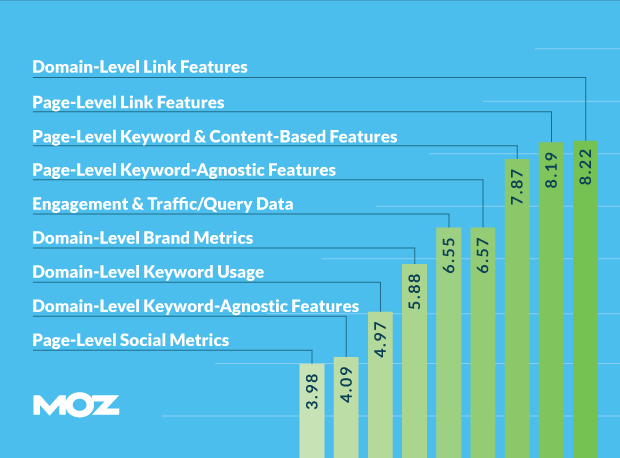Moz Reveals Search Engine Ranking Factors for 2015; Still Names Links as Highest Factor for Rankings
Internet marketing software developer Moz (@Moz) has just published its 2015 Search Engine Ranking Factors study. This is a report online marketers and SEO practitioners like you should look into to maintain or improve your rankings in the SERPs.
Why should you pay attention to this report and what are the key takeaways? Read on.
The Biggest Study Yet on Search Ranking Factors
With help coming from new data partners SimilarWeb (@SimilarWeb), DomainTools (@DomainTools), and Ahrefs (@ahfres), as well as over 150 search marketing professionals, Moz claims that this year’s study is the biggest they’ve put together yet on this topic.
The biennial study analyzed correlation data using 17,600 keyword search results from Google, as well as input from over 150 search marketing professionals, to determine which factors might help or harm rankings. And just like its 2011 and 2013 predecessors, this year’s study also includes a “Future of Search” section, which predicts what factors will be most dominant and influential to the practice of SEO over the next 12 months.
Correlation Data: Page Link Authority Features Show High Correlations with Google Rankings
“To be clear, the study doesn’t tell us if Google actually uses these attributes in its core ranking algorithm. Instead, it shows which features of pages and sites are most associated with higher rankings,” Moz explained in their blog. “It’s a fine, but important, distinction.” After all, Google is and has always been a black box. Relying on more than 200 closely guarded signals, it can only be observed to decipher what appears to be a good ranking factor.
For the study, Dr. Matt Peters from Moz’s Data Science team examined the top 50 Google results of 16,521 search queries, resulting in more than 700,000 unique URLs. “The numbers shown are mean Spearman’s correlation with higher rankings, meaning that a higher number indicates that websites/pages with the given feature tended to rank higher on average than those without,” Moz stated.
“Page Authority” remains the most important feature this year, according to the data provided by Moz. The item gained 0.37 score, making it one of the most correlated SEO metrics monitored by the company. Simply put, page authority is the probability or likelihood that a page from a site will be found on Google Search, or any other search engine. It’s actually a metric developed by Moz to measure how well a specific page will rank on SERPs.
Other high-ranking page link features include the number of unique IPs linking to the URL (0.31), the number of root domains with any pages linking to the URL (0.3), and the number of external equity links to the URL (0.28), indicating that non-spammy quality backlinks continue to be relevant to SEO.
Meanwhile, features such as the use of HTTPS and top-level domains (.com, .org, etc.) display very little correlation.
For more in-depth information on the results of Correlation Data, check out this Moz page.
Survey Results: Domain and Page Links, as well as Keyword and Content Usage, Dominate Ranking Factors, Experts Say
Apart from examining correlation data, Moz also surveyed more than 150 search marketing professionals to provide additional insights on Google’s overall search algorithm. These experts were asked to rate each ranking factor area on a scale of 1 (not influential) to 10 (highly influential).
As expected, domain and page links continue to top the list of the strongest and most influential ranking factors, receiving a score of 8.22/10 and 8.19/10 respectively. Page-level keyword and content usage, which includes content relevance scoring, optimization of keyword usage, and content quality, takes the number 3 spot, receiving a score of 7.87/10. [See Figure 1]
Other factors like keyword-agnostic features, engagement data, domain-level brand metrics, domain-level keyword usage, and page-level social metrics all received a score of 6 or less.
Visit this page to gain more insights from the industry experts.
What’s Next for Google Search’s Ranking Factors?
Is your SEO heading in the right direction? Predicting how the existing search ranking factors might change over the coming months, almost 90% of SEO experts surveyed agree that mobile-friendliness will take the spotlight as the top Google ranking factor, while 12% believe that its impact will stay the same.
Some 81% of the respondents believe that the analysis of a site or page’s perceived value will increase in significance, and 79% said that the quantity or quality of instant answers will increase in significance as well. When it comes to site speed, 58% said that it will rise in impact, while 41% said its impact will remain the same.
The relevance of many other prominent ranking factors—such as links, social signals (shares, likes, +1’s), and URL structures—are also expected to stay the same.
Meanwhile, the effectiveness of paid links and the influence of anchor text will not be as important to the algorithm, according to the majority of respondents.
The Biggest Takeaway: Great Content That Attracts Backlinks is Still King
If Moz’s correlation data and SEO survey results are any indication, the solution for search would still largely depend on the quality of content—content that attracts backlinks from authoritative sites. In other words, now is the time to actually produce shareable content so links would come to your site naturally.
This is the only way to avoid getting penalized by Panda and rank significantly on Google’s search results.
Marketing Digest Writing Team
Latest posts by Marketing Digest Writing Team (see all)
- How Taco Bell Struck Gold with Its Memorable Viral Marketing Campaigns - September 15, 2015
- Salesforce Marketing Cloud Releases New Instagram Marketing Tools - September 12, 2015
- Chrome Begins Pausing Flash Ads by Default to Improve User Experience - September 3, 2015


